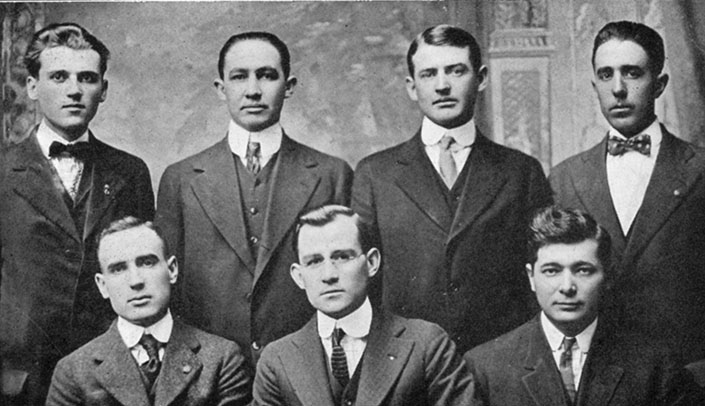Times change, and so do the courses offered by the colleges at UNMC. In the early 20th century, the University of Nebraska College of Medicine offered a course on embalming. Acting upon its responsibility to protect the public’s health, the eight-week course was offered each fall semester from 1915-1918.
Individuals enrolled in “Embalming and Sanitary Science” were required to be 21 years old, of good moral character, have at least two years of high school instruction and have at least one year of apprenticeship with a licensed embalmer. For $40, students received access to the College of Medicine laboratories and library, and College of Medicine faculty and members of the Nebraska Embalmers Association taught the course.
Students took classes on both the medically related and the practical sides of embalming:
- “Anatomy” covered the general structure of the human body and any connection to the unique job of embalming.
- “Bacteriology and Sanitary Science” covered the prevention of disease in the care of bodies and the conduct of funerals, bacteria and embalming, and the prevention of infection in embalming.
- “Pathology” included the presentation of tissues, comparison of the effects of various chemicals and embalming fluids in tissue preservation and the disposal of infected material removed at autopsy.
- “Chemistry” comprised the preservation action and disinfecting properties of inorganic and organic compounds.
- “Practical Embalming” covered the cosmetic effects of different embalming methods, causes of discolorations and methods of removal, and equipment and management of morgues.
Students attended lectures and demonstrations by members of the Nebraska Embalmers Association. The instruction included:
- “The Profession of Embalming”: Its history, growth, and relation to the public
- “Laying Out Bodies”: Preparation of hand and face, sterilization of orifices and the dressing of bodies
- “Cavity and Arterial Embalming”: Instructions for the management of cases in the home or morgue
- “Special and Difficult Cases”: Cases of contagious diseases, surgical and mutilated cases, preparation for shipment, and desiccation and mold
- “Funeral Management”
- “Legal Aspects of Embalming”
- “Rights of the Embalmer in Relation to Estates in Probate Court”
- “Theory and Practice of Embalming”: Including quizzes and demonstrations
- “Practical Work”: Opportunities for students to travel to instructors’ businesses to observe
After satisfactorily completing the course, students received a certificate from the Board of Embalmers of Nebraska in place of examination for the embalmer’s license.
